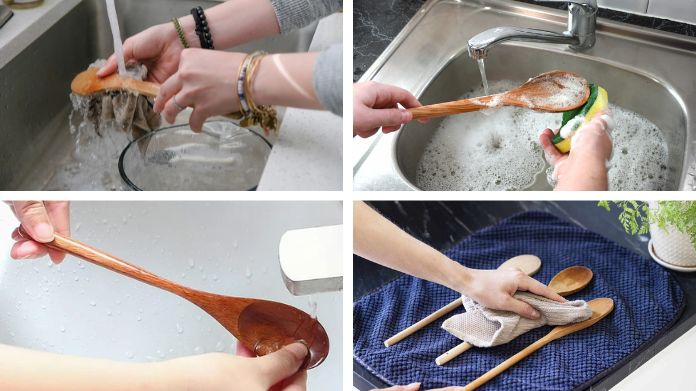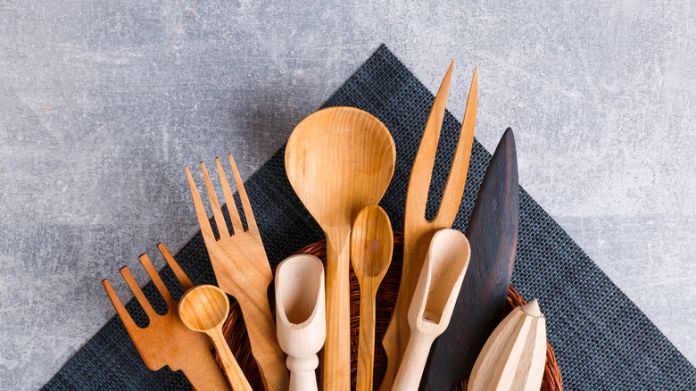If you cook often, you probably have a wooden spoon (or three) lying in your drawer.
They had been the silent heroes of the kitchen, quietly doing everything from stirring the curries to flipping the vegetables, or scooping the last bit of sauce out of the pot.
They were cold steel and lifeless plastic, which you usually turned away from, yet they felt, and still do, very warm and natural when held in your hand.
The catch is that they become unhygienic over time. That is an unseemly stain of tomato sauce that is never going to go away, or a nasty garlic smell that lingers, or maybe just little cracks that start making you question whether it’s still safe to use.
Relax! It’s not ruined yet. With a little bit of care, you can clean wooden spoons and maintained properly, and I’ll give you an exact breakdown of how.
Table of Contents
Why Wooden Spoons Are a Kitchen Essential?
 Wooden spoons are simply wonderful. They are solid, ecological, and would not scratch your pan as metal utensils do.
Wooden spoons are simply wonderful. They are solid, ecological, and would not scratch your pan as metal utensils do.
Above all, if well-maintained, they get better with age. You know, they also somehow remind you of the past.
The grandmother of mine used to have only one wooden spoon, and with that she did everything, in hot milk she would put in the spoon, and she would stir chutney powder too.
After so long a time, it was still smooth and reliable in her hands. In one word, silicone and plastic spoons could never come close to that supreme kind of goodness. Such charm is hard to find in silicone or plastic spoons.
Common Issues: Stains, Odors, Cracks, and Warping
Of course, wooden spoons come with quirks. Cook something with turmeric or tomato, and boom, the spoon takes on a bright stain.
Chop garlic and stir it, and suddenly the smell seems permanent. Maybe it is even that you could damage your spoon if you leave it soaking in water for a very long time.
Look at it when you are taking out a spoon that is all mossy on the surface. That’s why it’s important to clean wooden spoons properly.
Why Wooden Spoons Require Special Care?
Here’s the thing about wood: it’s porous. Think of it more like a sponge, it absorbs the water, grease, and odour.
Thus, it is not enough to just bucket it in the sink and forget about it. In this condition, the wood can swell or crack, and perhaps even turn into an amusement park for bacteria.
And please, don’t put wooden spoons in the dishwasher, the heat and harsh detergent are basically spoon torture.
How to Clean Wooden Spoons Safely?

Caring for wooden spoons is actually pretty simple if you make it a habit.
- Rinse promptly – As soon as you’re done cooking, rinse your spoon under warm water. Don’t let it sit in the sink soaking.
- Wash by hand – Handwashing does not require more than a mild dish soap and a soft sponge cleansed gently to remove food bits.
- Rinse well – Soap is templated to seep into the wood, therefore, rinse thoroughly.
- Dry immediately – Pat dry with a towel and let it air-dry standing up, not flat on the counter.
That’s it, easy and quick, just like brushing your teeth. These steps ensure that you clean wooden spoons without damaging them.
Natural Solutions to Deep Clean Wooden Spoons
Daily cleanings are not always meant to be enough. When the spoon still smells like last week’s garlic or has stubborn old stains, through these hacks, you will have kitchen co-benefits:
- Baking Soda Paste – Mix baking soda with a little water to form a paste, rub it on stains, and rinse. Works like magic.
- Lemon & Salt Scrub – Sprinkle coarse salt on the spoon, then rub with half a lemon. It scrubs away odors and leaves the spoon smelling fresh.
- Vinegar Solution – Mix one part vinegar with four parts water. Let the spoon soak for a few minutes once a month to disinfect.
- Hydrogen Peroxide – A gentle alternative to vinegar that helps kill bacteria without harsh chemicals.
Your spoon will come out looking and smelling new again.
Special Treatments to Restore and Maintain Wooden Spoons
 Think of this as a little spa day for your spoons. Every few weeks, rub them with food-safe mineral oil, beeswax, or walnut oil.
Think of this as a little spa day for your spoons. Every few weeks, rub them with food-safe mineral oil, beeswax, or walnut oil.
This keeps the wood moisturized, prevents cracking, and gives the spoon a smooth finish. If the spoon feels rough or fuzzy, a quick sanding with fine-grit sandpaper brings it back to life.
Common Mistakes to Avoid When You Clean Wooden Spoons
A few quick “don’ts” that will save your spoons:
- Don’t put them in the dishwasher (too harsh).
- Don’t soak them in water overnight (they’ll swell and warp).
- Don’t use bleach or strong chemicals (they’ll dry out the wood).
- Don’t leave them in damp places or direct sunlight. Your spoons aren’t sunbathers!
When to Replace Wooden Spoons?
Even with the best care, spoons won’t last forever. If yours has deep cracks, splinters, or a funky smell that just won’t leave, it’s time to say goodbye.
Most people replace wooden spoons every five years or so but if one looks unsafe, replace it sooner.
Our Thoughts
Wooden spoons are the simple principles of life, but with perfect care, they will be with you for ages and will make cooking much more pleasant.
By decontaminating them swiftly and gently and by giving them their occasional “spa treatment,” you will be able to keep your spoons clean and in good condition without your help; they will not get damaged.
It is that small ritual that will give you not only healthier foods but also a smiling kitchen.

